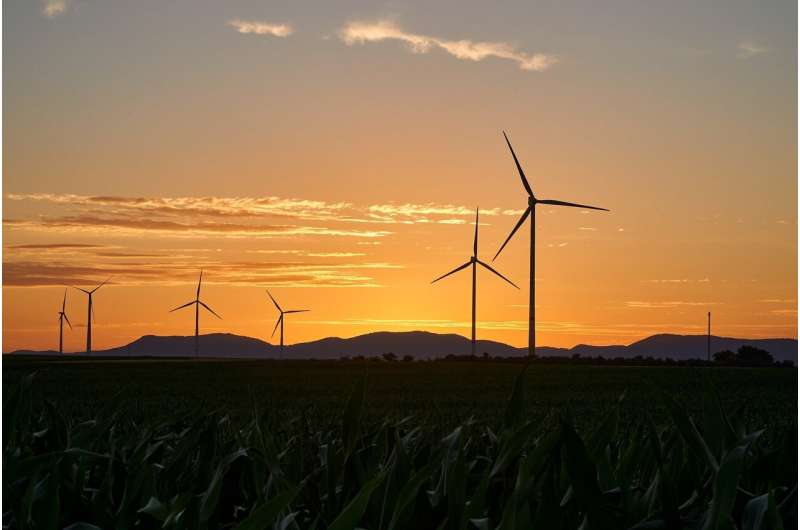What Donald Trump's dramatic US trade war means for global climate action

US President Donald Trump's new trade war will not only send shockwaves through the global economy—it also upsets efforts to tackle the urgent issue of climate change.
Trump has announced a minimum 10% tariff to be slapped on all exports to the United States. A 34% duty applies to imports from China and a 20% rate to products from the European Union. Australia has been hit with the minimum 10% tariff.
The move has prompted fears of a global economic slowdown. This might seem like a positive for the climate, because greenhouse gas emissions are .
However, in the long term, the trade war is bad news for global efforts to cut emissions. It is likely to lead to more energy-intensive goods produced in the US, and dampen international investment in renewable energy projects.
How does global trade affect emissions?
Traditionally, growth in the global economy leads to greater emissions from sources such as energy use in both manufacturing and transport. Conversely, emissions tend to fall in periods of economic decline.
Trade tensions damage the global economy. This was borne out in the tariff war between the US and China, the world's two largest economies, in 2018 and 2019.
Trump, in his first presidential term, imposed tariffs on billions of dollars worth of imports from China. In response, China introduced or increased tariffs on .
As a result, the International Monetary Fund estimated global gross domestic product (GDP) would . The extent of its true impact on GDP is difficult to determine due to the onset of COVID in the same year.
However, Trump's tariff war is far broader this time around, and we can expect broadscale damage to global GDP.
In the short-term, any decline is likely to have a positive impact on emissions reduction. We saw this effect during the COVID-19 pandemic, when global production and trade fell.
But unfortunately, this effect won't last forever.
Domestic production isn't always a good thing
Every country consumes goods. And according to Trump's trade plan, which aims to revive the US manufacturing base, the goods his nation requires will be produced domestically rather than being imported.
Unfortunately, this US production is likely to be inefficient in many cases. A central tenet of global trade is that nations focus on making goods where they have a competitive advantage—in other words, where they can manufacture the item more cheaply than other nations can. That includes making them use less energy, or creating fewer carbon emissions.
If the US insists on manufacturing everything it needs domestically, we can expect many of those goods to be more emissions-intensive than if they were imported.
Renewable energy slowdown?
Globally, investment in renewable energy . The US trade war jeopardizes this growth.
Renewable energy spending is, in many cases, a long-term investment which may not produce an immediate economic reward. The logic is obvious: if we don't invest in reducing emissions now, the economic costs in the future will be far worse.
However, the US tariffs create a new political imperative. Already, a global economic recession and increase living costs around the world.
National governments are likely to become focused on protecting their own populace from these financial pressures. Business and industry will also become nervous about global economic conditions.
And the result? Both governments and the private sector may shy away from investments in renewable energy and other clean technologies, in favor of more immediate financial concerns.
The COVID experience provides a cautionary tale. The unstable economic outlook and higher interest rates meant banks were some renewable energy projects.
And , small to medium-sized businesses became more reluctant to invest in renewable energy applications such as heat pumps and solar panels.
What's more, the slowing in global trade during the pandemic meant the supply of components and materials vital to the energy transition .
There are fears this disruption may be repeated following the US tariff move. For example, the duty on solar products from China to the US , just as demand for solar energy from US data centers and artificial intelligence use.
Few nations can afford to impose retaliatory tariffs on US imports.
Prime Minister Anthony Albanese, for example, Australia would not follow suit, adding the move would be "a race to the bottom that leads to higher prices and slower growth".
China, however, can be expected to return fire. Already it has of liquefied natural gas (LNG) from the US for 40 days—a move attributed to trade tensions.
This may seem like good news for emissions reduction. However, China, like all other nations, needs energy. With less gas from the US, it may resort to burning more coal—which than gas.
An uncertain time
Free global trade has worldwide benefits. It helps and stimulates innovation and technology. It can and .
And, with the right safeguards in place, global trade can help . Global trade improves efficiency and innovation and technology. This is likely to benefit innovation in clean energy and energy efficiency.
Trump's tariff war weakens global trade, and will slow the world's progress towards decarbonization. It is a most uncertain time—both for the world's economy, and its climate.
Provided by The Conversation
This article is republished from under a Creative Commons license. Read the .![]()















